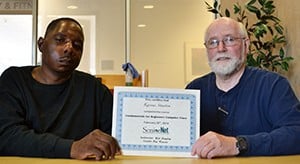Stroke Survivor Reconnects through SeniorNet Classes
March 20, 2014 | Karene Stanton used to fix cars and trucks for a living, and then he had a stroke at the age of thirty-six. Three years later, SeniorNet at the UAMS Donald W. Reynolds Institute on Aging is teaching him new skills that may allow him to put back together something else — the rest of his life. “I would like to give all the glory to God,” said Stanton, of Little Rock. “Without him, I wouldn’t be here in this computer class. Truly wonderful people who care have urged me not to give up. Before I came here, I was just laying around the house watching television. I’ve met some truly lovely and talented people. They’re willing to help with every need that I have. I’ve never had that in my life.” The SeniorNet program at UAMS provides computer training to seniors 50 and older to broaden their horizons through computer skills and use of the Internet. It is sponsored by National SeniorNet and made possible through generous contributions from the UAMS Institute on Aging and Microsoft Corporation. Although Stanton is 39, a section of the organization’s by-laws allows for exceptions in cases like his, said Charles Frith, a SeniorNet instructor. Stanton was having trouble mastering his iPad, and one of the Fitness Center Team asked SeniorNet if they could help him. A space was available in one of the program’s February classes, so Frith enrolled him. Kerene is especially appreciative of the Ottenheimer Therapy and Fitness Center Fitness Team, consisting of Kellie Coleman, Sheery Woods, Sheffield Duke and Martha White. SeniorNet classes normally consist of eight students, an instructor and one or two coaches. The coaches circulate among the students and help them as needed. Each class meets twice a week for four weeks. In Kerene’s case, SeniorNet decided that he might need to be coached one-on-one. Frith volunteered to help him on Mondays and Mark Gross, SeniorNet Board member and coach, volunteered to help him on Wednesdays. SeniorNet instruction has taught Stanton how to email, download files and use a keyboard, as well as other fundamental computer skills. His stroke has left him with speech difficulties, and he has to use a wheelchair to get around. A transportation service picks him up in the morning and takes him to the Institute on Aging and returns him home in the afternoon, but sometimes he has to take public transportation. Communication with family members and others has become easier for Stanton through computer and Internet use and allowed him to reconnect to the world in all sorts of other ways. His physical mobility may be limited, but he can Web surf with the best of them. “He’s done really well in the class,” Frith said. “He can take his course book and pretty much follow it completely. He did better than several of the other people in the class.” Stanton said he wants to return to school and acquire the skills to become a physical therapist. He wants to help people who have become physically impaired by stroke. Since acquiring his new computer skills, Stanton has taken online classes and applied for jobs online. “Having a stroke is something you have to deal with,” Stanton said. “You can get out and have a regular life like anybody else, whether you’re in a wheelchair or not.” |


